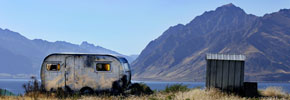SPECIAL REPORT: A question of intelligence
Sunday Star Times | Sunday, 02 December 2007What information led the police to smash the Urewera 'terrorist' training camps? Nicky Hager investigates the intelligence trail which led from cafe conversations to the armed police response.
Two years ago a man quite similar to central characters in the Urewera "terrorism" case purchased a pistol holster on TradeMe for $66. Officers at the Otahuhu police intelligence centre which later led the Urewera investigation noticed the TradeMe sale and prepared an affidavit saying they "believed"' the suspect had bought the holster because he had a pistol and "intends to use the pistol to overthrow the New Zealand government".
A court granted a search warrant on the basis of these allegations and armed police raided the man's home. No pistol was found, no charges resulted and the New Zealand government was in no risk of being overthrown. The man has a reputation for extreme-sounding public statements but the moral of the story is that a "worst case scenario" affidavit can be exaggerated and unrealistic.
Some of the people at the centre of the Urewera "terrorist" case are also well known for extravagant rhetoric. It was their inflammatory talk of "war" and other disturbing statements, as leaked to the media from the police affidavit, that formed the basis of the terrorism charges.
The affidavit has now been widely circulated, including on the internet last week. Many will have read it. But what is an affidavit and what should we make of it?
A police affidavit for a major and lengthy investigation of this sort is a complex and fascinating document.
Each time the police want a new search warrant or interception warrant, they add their latest evidence to the growing document and make their case for the latest warrant. It is an evolving document which, since its function is to persuade the courts to give police more powers, contains their most compelling evidence.
Thus an affidavit shows the progress of the investigation, but is not intended to be a balanced document. The police might collect hundreds of hours of intercepted conversations and include only snippets that support their allegations. No doubts are expressed and evidence that contradicts the suspected offences is generally not included. If all you see of the evidence is an affidavit, it can give a highly distorted picture of a case. This makes it hard for the public to judge the Urewera issue since, to date, much of the news media information about it comes from the one leaked affidavit.
Large parts of the Urewera affidavit record surveillance operations extending back to mid-2006, as police tried to establish who attended the bush camps, or "quasi military training camps" as they are described in the affidavit. (A large majority of attendees were Maori with only a handful of Pakeha activists.)
The affidavit describes an extraordinary scale of intrusion into many people's lives. Police watched them come and go from their homes, bugged their phones, cars and houses and accessed their bank accounts and all their government records. They captured huge amounts of intimate domesticity as well as the snippets of wild talk from a handful of the dozens of suspects.
Some surveillance activities were deleted from the affidavit these paragraphs just read "Police Surveillance Techniques", although one was clearly surveillance of a house but a wide range of other powers are visible.
First there were the visual surveillance teams which don't require warrants that watched houses, tailed suspects' cars for long distances, eavesdropped on conversations in cafes and took photographs. Other teams installed covert video cameras none of which required special warrants.
Next there were Section 198 search warrants, which police readily obtain for any offence punishable by imprisonment. These gave access to bank accounts, phone companies and a regular police method of tracing people power bills.
From the phone companies the police obtained call data, one of the main investigation tools. Call data is a record of all calls to or from a phone, including times and dates. More important, call data search warrants also captured all the text messages and the location of the phones (the nearest cell tower). Analysis of call data and text messages provided the main method of identifying and tracing people caught up in the investigation.
Then there were interception warrants for bugging phone conversations, houses, meeting rooms and vehicles.
These and other types of surveillance are a striking example of the data trails left by every one of us through modern communications, databases and even shopping.
Police were able to trace people's activities through eftpos purchases, airport Customs' records, Work and Income records, ACC records, passport applications and other contacts with government agencies.
One person's name and mobile phone number were pulled out of the police intelligence databases because they'd been saved into the mobile phone of a completely unrelated person arrested by police at another time.
Another person's travel was tracked from ferry records, an eftpos transaction in a petrol station and then footage from the petrol station forecourt accessed three weeks afterwards.
In various instances, people had contact with police over things like their stolen car or a speeding ticket, with the information they provided later retrieved from the police computers. Many people had already been studied by police intelligence staff, not because they had ever broken the law, but because of their involvement in protests.
All these are glimpses of the workings of police intelligence.
Media reports have suggested that evidence collected for the now abandoned terrorism charges cannot be used in the remaining Arms Act charges.
In fact, all the visual surveillance, including video of people in the bush, plus the text messages, call data and the rest of the data trail gathered under search warrants can be used for any offence (such as arms charges) punishable by imprisonment.
Only the bugging of conversations that provided some of the most shocking but least substantial evidence cannot be used for the lesser charges.
There's a distinct point in May when the affidavit starts talking about terrorism until then, phone bugging was under a "serious violent offence" warrant. But from May 16 they conducted the bugging operations using a special anti-terrorism interception warrant created in 2003 counter-terrorism legislation.
Soon after, there is what appears to be legal advice analysing the 2002 Terrorism Suppression Act and arguing it was relevant to the Urewera case.
Thereafter it seems the police were set on uncovering terrorism, a mindset that led inexorably towards the 300 armed police raiding houses on October 15 and the subsequent terrorism charges.
Only after the solicitor-general received the police affidavit in late October with nine extra pages, which contain information from police informers, on top of the 156-page leaked version did he realise that the case for anti-terrorism charges was too weak to proceed.
The terrorism surveillance warrants had required a police officer to swear on oath that there were "reasonable grounds for believing... that a terrorist act [was] about to be committed", but the police had found no credible evidence of any such plans.
Recriminations have begun inside the Wellington bureaucracy over how the case went wrong: the terrorism charges that failed, the overreaction in the dawn raids and who let it happen. Why, for instance, did the police, who should have experience of all the ways people act, seem to take every radical and incoherent utterance they intercepted as literal fact and serious intention?
A large part of the affidavit's force comes from the omission of information that didn't fit the terrorism story.
For instance, nowhere in the affidavit is there mention of the fact the bush camps included training sessions on subjects as diverse as Maori herbal medicines, bush skills and Tuhoe history. But this context helps explain why a range of peaceful young Maori and environmental and peace campaigners were at supposed terrorist training camps.
By emphasising highly selective quotes from a small number of hotheads, the police built an impression of al Qaeda-style terrorist training camps.
Which is not to deny that some of what the police observed and overheard did give grounds for serious concern.
The camps included people learning to use firearms, which is a lawful part of the Urewera way of life. But, judging from evidence in the affidavit, some people were mixing firearms and military-style training with their hothead political talk. This is not necessarily illegal, but it is foolish and dangerous. The people who joined in should have known better. Some at the camps openly expressed concern. The police did everybody concerned a favour by disrupting it.
But would it have resulted in terrorism? It's very unlikely.
There is far more risk of violence to society from, for instance, many gangs than there ever was from the disparate group of people attending the Urewera camps. In the weeks since the October arrests, for example, a man appeared in court in Christchurch for having 40 unlawful weapons, including pistols and shotguns, while a Hawke's Bay Hells Angels member was convicted for a stash of 25 stolen weapons, including machine guns, pistols and semi-automatics. The "arsenal of weapons" imagined in early "guerrilla training camp" news stories turned out to be nothing like these all-too-common arms offences.
The final pages of the affidavit summarise the police's case.
The "aims of the group", the detective sergeant writes, "has been shown through the following intercepted communications, which I believe shows they ultimately want to secure an independent Tuhoe Nation". The five fragments of conversation cited which unfortunately cannot be printed are astoundingly weak evidence of plans to secure a Tuhoe Nation or anything else.
The following section summarises the group's supposed plans: "The type of actions the group intends to achieve their aim has been shown through the following intercepted communications," the detective sergeant writes, listing 19 more fragments of conversation from the 19 months of monitoring. These intercepted pieces of conversation also cannot be printed, but presenting them as meaningful evidence of a terrorist conspiracy shows a surprising lack of judgement.
Again, an incoherent scattering of radical big talk is treated as literal fact and serious intention.
The police intelligence officer concludes a year-and-a-half investigation with this judgement: "I believe [these quotes/plans] amount to multiple terrorist acts." He might just as well have written: "I believe they intend to overthrow the New Zealand government."
For a year, the growing affidavit had been used to justify increasing surveillance, but this final version, completed on October 10, sought approval to raid about 40 homes basically everyone the police thought had been at one of the camps.
Most of the officers who took part knew nothing about the case in advance. They were brought together for briefings at 3am on Monday, October 15, many thinking they were part of another P lab operation.
Instead they were given the lurid version of terrorist threats presented in the police affidavit: IRA-style groups, illegal weapons and all. The police intelligence conclusions about impending acts of terrorism set the scene for the paramilitary operation that followed. With little time to digest the news, the officers headed out fired-up and ready to subdue the terrorists. Soon people were waking up with doors being smashed in, machine guns pressed to heads and families held at gunpoint.
• Footing the protest bill
• Tem's row brings cops
• Officer wins dismissal case
• The suburbs to home in on
• Head girl, head boy get top marks, others on a warning
• Valour Alcove's heart ripped out
• Past thefts
• Sidecar crash victim on road to recovery
• Heads get pupil bonus in pay deal
• STEVE BRAUNIAS INTERVIEW: He plays the guy whose head exploded
• STEVE BRAUNIAS INTERVIEW: The unquiet American
• COMMENT & REVIEW: Going public on private screening
• SST photographer takes top sport award







